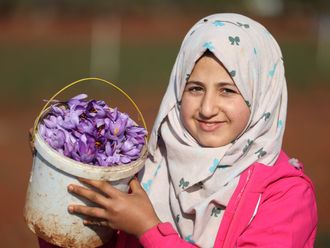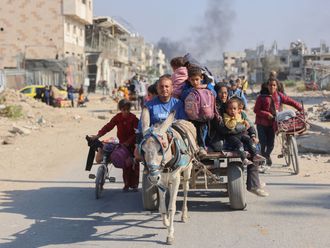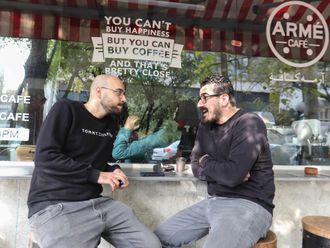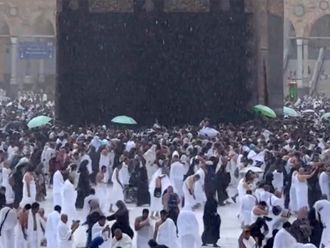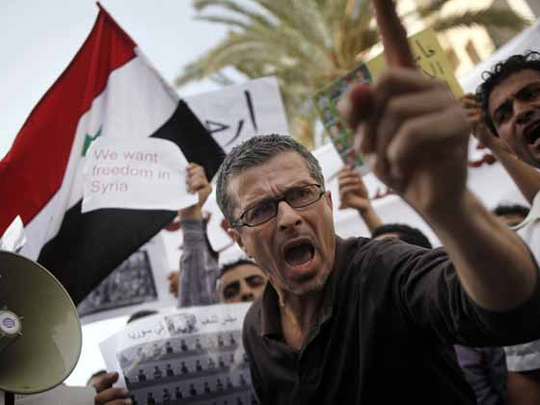
Damascus: Communication networks failed in Syria on Sunday one day after authorities arrested dozens of pro-democracy activists in a crackdown against anti-government protests.
"There is an arrest campaign and phone lines are down so people are suspecting interference but the government says it is a technical problem," a resident of Douma, north of Damascus, told AFP.
In the capital, the internet was down and cell phone communications were practically impossible, although land lines seemed to be working fine.
A customer representative of Syria's phone and internet provider told AFP the problem "was due to an overload of connections" without adding further details.
Syriatel and MTN, Syria's two phone companies, offered customers one hour of free calls valid between April 2 and 6 "in recognition of the people who stood with the President (Bashar) Al Assad during the day of dignity". They were referring to pro-regime demonstrations in the capital Tuesday.
Syrian President Bashar Al Assad has appointed Adel Safar, who served as agriculture minister in the government of Naji Al Otari which resigned last week, to form a new government, an official Syrian source said on Sunday.
The source said Safar was expected to announce his new cabinet within two days. Al Assad accepted the resignation of Otari's government on Tuesday after a wave of protests in Syria in which witnesses and activists say at least 60 people have been killed.
On Friday, thousands of Syrians marched across the country, calling for reforms, disappointed by a presidential speech which failed to lift a state of emergency in place since 1963.
In a joint statement, eight human rights groups said 46 people were arrested in raids that targeted the southern town of Daraa, one of thee main centres of more than two weeks of demonstrations, as well as Douma north of Damascus and the industrial city of Homs.
"We condemn this extremely violent and unjustified way the Syrian security services dealt with peaceful rallies in Douma where police used excessive force against demonstrators," said the statement.
The rights groups reported that four people died and dozens were wounded in the crackdown. A human rights activist reported eight dead.
A witness told AFP security forces used live ammunition to disperse stone-throwing protesters after noon prayers.
The authorities denied the security forces were responsible for the deaths, blaming them on an "armed group" which opened fire from rooftops on both demonstrators and police.
They acknowledged an unspecified number of deaths and said dozens were wounded, some of them policemen. State television charged that "some of the demonstrators had daubed their clothes with red dye to make foreign reporters believe that they had been injured."
Some 200 people demonstrated outside the courthouse in Daraa, a tribal town near the Jordan border, where security forces arrested eight people between a morning raid and a round-up after the protests, an activist told AFP.
Security forces carried out a series of raids in the area, another activist said, adding that architect Khaled Al Hassan, lawyer Hassan Al Aswad and teacher Issam Mahameed were among those detained.
Daraa deaths
Yousuf Abu Rumiyeh, a member of parliament for Daraa, denounced security forces for opening fire on his constituents "without pity" and criticised Assad for not offering his condolences.
The security forces "opened fire on the citizens of Daraa, killing and injuring them and preventing the wounded from getting to hospital", said Rumiyeh, in a video uploaded to YouTube.
"The people of Hauran were waiting for President Assad to visit to offer his condolences. Had he done so, nothing that happened subsequently would have taken place."
In Homs, the Syrian Observatory for Human Rights documented 17 arrests while authorities accused another "armed group" of firing on demonstrators in the industrial city and killing "one girl."
The rights group demanded the release of all prisoners of conscience and political prisoners, and called for measures to ensure the safety of peaceful protest.
Hundreds of Syrians chanted "freedom" as they gathered early on Sunday to receive home wounded protesters in Douma, the Damascus suburb taking the fight closest to President Bashar Al Assad's seat of power.
Some 50 wounded arrived in secret police cars around midnight in Municipality Square, where at least five were killed on Friday when rights activists said security forces fired at protesters demanding political freedoms and an end to graft.
Thousands took to the streets in major cities after Friday prayers, defying the security forces who fired teargas and live ammunition and used batons to try to disperse protesters who have dismissed reform gestures by Assad.
Secret police agents gave the names of 25 people in hospital with serious injuries, a witness in Douma said, adding that the authorities had promised to deliver the bodies to families of the dead before noon prayers. "Society figures made it clear to the authorities that Douma wants its dead. We are expecting 15," one resident said.
The authorities, facing mass protests that erupted in the southern city of Daraa 16 days ago, have not been readily handing over bodies, but they might make exception in Douma, a link between Damascus and the countryside where demonstrators have shown a high degree of organisation, activists said.
"Douma is boiling. Syria as a nation may no longer keep sitting idly and let a historic chance for freedom pass by," one of the activists said of the area some 15 km north of the city. "Men are realising that they are hiding at home while their wives are going out in the streets and getting arrested."
Another witness who toured the suburb on Saturday said shops in at least one main commercial street were closed in solidarity with the protesters, who gathered after Friday prayers despite the heavy security presence.
The killings in Douma brought to at least 60 the number of deaths in protests against Baath Party rule. Activists say Douma has become a meeting point for people from villages near Damascus who have descended on the city.
In Daraa, where protests started before they spread to Damascus, the coast and areas in between, security forces dispersed a sit in on Saturday at Serail Square and arrested at least 20 people, witnesses said.
"Our demands are same, same: freedom, freedom," the protesters, who numbered 200 to 300, chanted.


